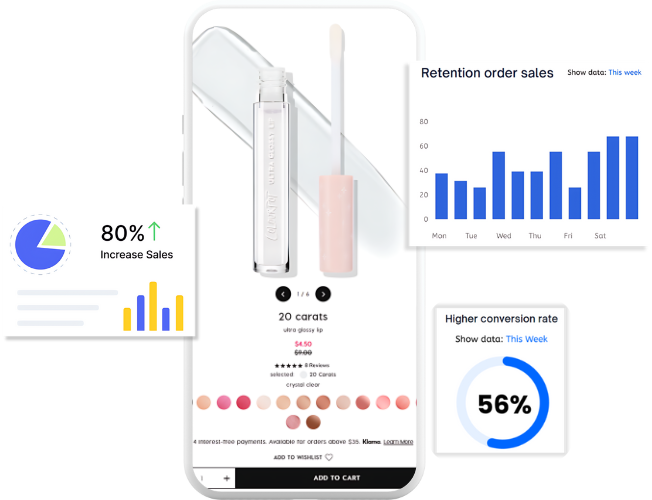It’s well known that Etsy and Shopify are prominent in the field of e-commerce. They provide sellers with a handy online platform to promote and sell their goods. The trade-off between Shopify and Etsy is significant for merchants doing online business. The post will help you choose a platform logically by comparing Etsy and Shopify.
Etsy vs Shopify: An Overview
What is Shopify?
Founded in 2004, Shopify is a one-stop SaaS-based e-commerce service platform. Global sellers can build dedicated and independent websites on Shopify to foster their brands. It provides various services, ranging from shop establishment and product management to third-party payment, making it more suitable for sellers who focus on brand shaping. Up to now, more than 1.75 million merchants have used Shopify as their primary platform for online selling.
Shopify Pros & Cons
Pros of Shopify:
- Easy to use: An intuitive and simple interface provides users with a smooth experience. Users can operate their online store without any extensive technical knowledge requirement.
- Straightforward payment process: Besides Shopify Payments, it also supports third-party payment such as Apple Pay, Paypal, Amazon Pay, and so on. International currency and language, which facilitate overseas transactions, are also available.
- 24/7 support: Shopify provides 24/7 customer support, assisting users with their queries, troubleshooting, and technical issues promptly.
- Fully functional app store: With over 7,000 apps, such as product management, and order management, the Shopify app shop offers users useful tools to help them improve efficiency and streamline selling processes.
- Delicate Templates: Offering a wide range of high-quality themed templates that are compatible with different devices is a huge resource for sellers to design the pages of their online stores.
Cons of Shopify:
- Higher Fees: Compared with other platforms, the transaction fees of Shopify will be higher. Its service is subscription-based with different tiers, which not only requires periodic payments but also leads to cost-rising when your commercial size changes. It may limit the profitability of small businesses.
- Limited Customization Options: For those who are looking for more intricate customization, Shopify’s limited customization inhibits their ability to design their online stores creatively. Although it provides abundant templates, some functions are limited. For instance, you can not modify the layout and design color. Moreover, some custom features can not be achieved because of the inadequate App solutions.
- No Email Hosting: The most glaring flaw of Shopify is the lack of native email hosting, which is significant in online marketing. It’ll be time- and labor-consuming, though some third parties like G Suite and Zoho can provide relative solutions.
What is Etsy?
Established in 2005, Etsy serves as a C2C e-commerce platform that builds bridges between customers and different designers. You can consider it a worldwide marketplace for distinct and inventive goods that are distinctive. Active sellers hit 7.9 million and buyers rose to 89.9 million in the first half of 2023.
Etsy Pros & Cons
Pros of Etsy:
- Quick Setup Time: Setting up Etsy doesn’t require much time or energy. The process of building your Etsy store is easy and all you have to do is open an account and set up your product.
- Specific Market Focus: Etsy provides a unique platform for sellers who focus on unique, handmade, and vintage goods. It is also an excellent marketplace for buyers searching for these items.
- Active Community: Etsy Reader Rank is not only a tool for sellers to build and shape their brand image but also can boost the visibility of sellers’ items. Under such conditions, Etsy will be suitable for new sellers to launch their ventures.
Cons of Etsy:
- Limited Market Scope: Mainly a platform for selling products such as handicrafts, antiques, vintage, and so on. It limits customization and product categories, which will also not be conducive to product diversification.
- Increasing Fee: Listing fees may accumulate as the numbers and types of products increase. Moreover, the transaction fee will sometimes increase. For example, it increased from 5% to 6.5% in 2022.
Shopify vs Etsy: Detailed Comparison
Etsy vs Shopify: Ease of Use
Setting up Etsy doesn’t require much time or energy. If there are products ready to sell, the Etsy store will be up and running in a matter of hours. What you need to do is open an Etsy account and set up your products.
The user interface of Shopify is clean, simple, and intuitive. It leads you to set everything up step by step, which is suitable for beginners. However, Shopify operation mode is very complex, though it provides flexibility for custom shops.
Etsy vs Shopify: Pricing
Esty:
- Listing Fees: Each item listed for sale on Etsy will be charged a listing fee of USD 0.2, valid for four months. After paying, the sellers are allowed to edit their products freely without any additional fees.
- Transaction Fees: Etsy charges a transaction fee of 6.5% of the displayed price, covering shipping and gift wrapping. Once purchases are finished, the transaction fees are charged automatically.
- Advertising and Promotional Fees: Etsy provides advertising services, such as Etsy Ads and Offsite Ads, to promote listings and shops. The budget of Etsy Ads is controlled by yourself, while the latter depends on sales history and is charged on attribute orders.
- Subscription Fees: Reputable sellers can join Etsy Plus, which is a subscription package that provides some tools for sellers to enhance the influence of their products and brands. The subscription fee is USD 10 per month.
- Other Fees: In addition to the above, there are various fees. For instance, you will be charged USD 0.20 for in-person sales by using Square Reader.
Shopify
- Tiered Fees: Shopify runs on a subscription-based model, offering a variety of plans with tiered features and transaction fees. For small to medium-sized merchants, there are three tiers of fees: $33/month, $92/month, and $399/month. Different tiers have different delivery discounts, payment rates, and functions such as gift cards and reports.
- Shopify Plus: For the larger brands, it’ll be better to choose Shopify Plus. It costs approximately $2000 per month, or 0.25% of monthly sales, and is limited to USD 40,000. Moreover, it will charge a percentage of the service fee.
Etsy vs Shopify: Customization and Design
Etsy limits extensive store customization as it needs to keep its unified marketplace style and layout. Shopify provides users with extensive customization options with drag-and-drop design tools, allowing unique brands and designs. Still and all, Etsy has a separate channel called Pattern that enables you to create your personalized website and online store.
Etsy vs Shopify: SEO
Etsy simplifies SEO with straightforward keyword optimization, but it has limitations on customization. Shopify’s SEO offers direct control and better search engine visibility with built-in SEO features, some of which are automatic. With these built-in features, you can optimize content conveniently. For example, directly editing your title tags, webpages, collections, and so on.
For Etsy users, they need to pay more attention to Etsy’s search engine. On the other hand, considering the independent website of Shopify, you need to focus on Google for SEO.
Etsy vs Shopify: Extensions & Apps
Shopify’s extensive app provides a variety of integrations that help users expand the functions of their online stores. Users can select relative third-party integrations to improve their stores’ functionality.
However, Etsy prefers to focus on internal features instead of external integrations, which is limited in the selection of built-in apps. In this circumstance, it restricts store functions and app options for users.
Etsy vs Shopify: Hosting and Security
Shopify ensures robust hosting services and advanced security measures, empowering users with control over their store’s security configurations. Meanwhile, Etsy centrally manages hosting, maintaining a secure platform but with limited control for individual sellers compared to Shopify’s user-managed hosting environment.
Conclusion
A contrasting look at Etsy and Shopify provides merchants with a sort of moonstone when negotiating the Ocean depth. If you pay attention to the large market, Shopify is your best choice while Etsy is fit for handmade and vintage product sellers.
The right choice depends on the unique needs, aims, and tastes of any given businessman. Equipped with knowledge and practical experience, you can bravely enter the world of e-commerce to create a compelling online image!
FAQs About Etsy vs Shopify
Note: This blog was originally written in English and translated using an automated tool to make the content accessible to a global audience. We believe in sharing valuable insights with everyone and apologize for any inaccuracies. If you spot any errors, please feel free to contact us for corrections. Your feedback helps us improve and ensures the content’s value is fully realized.







